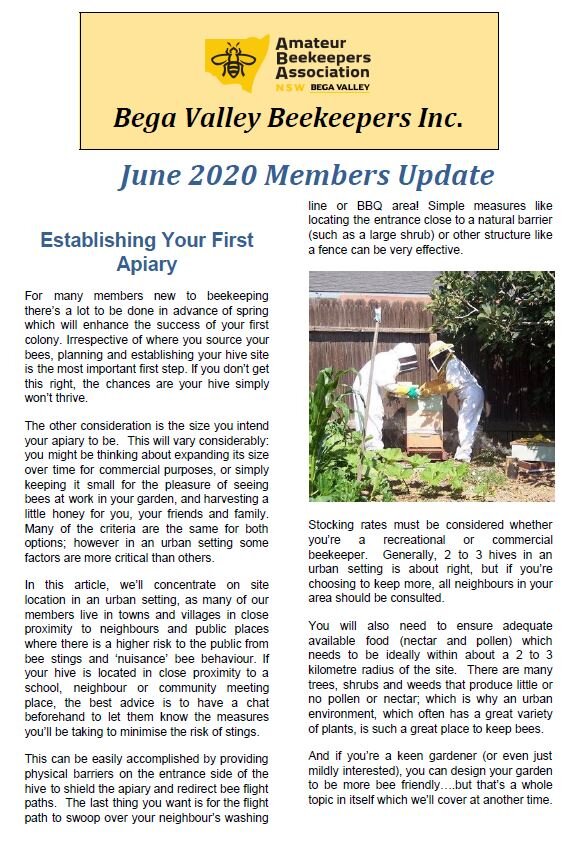Bega Valley - World Bee Day press release
Celebrating World Bee Day 2020 in the Bega Valley
“Celebrating World Bee Day this year has taken on a whole new significance to the entire community, in light of the devastating, combined impact of years of drought and recent bushfires” said Fay Steward, President of the Bega Valley Beekeepers Association.
Thousands of hectares of native forest essential to the survival of native wildlife and the beekeeping industry have been lost, and according to the NSW Apiarist Association, this could lower honey production in NSW by about 30% for at least the next 10 years.
Many hives were destroyed by fire in our region, and this, combined with the resulting loss of forested areas, which normally provide good nectar and pollen sources, is a major concern to the beekeeping industry and primary industry producers, who rely on bees for pollination.
“The economic impact may be substantial” she said “with estimates of around $36 million being contributed annually to the NSW economy through the production of honey and hive related products”.
World Bee Day is a timely reminder of the importance of bees in making life possible for humans. They pollinate crops, and are thought to be responsible for one in three of every spoonsful of food we eat. Even more important is the essential role bees play in balancing our ecosystems; and it is alarming that bee species are declining world-wide.
The expression “think globally - act locally” has never been more important, and the Bega Valley Beekeepers Association has encouraged members to dig another bee loving plant into the garden, or give one as a gift on Wednesday 20 th May, which is the United Nations designated World Bee Day.
Bega High School, which established an apiary 2 years ago, is doing just that. Their aim is to encourage awareness of the importance of pollinators, such as bees, the threats they face and their contribution to sustainable development. The school also boasts a magnificent bee themed mural painted by students when the apiary was established.
Fay said people wishing to get started in beekeeping are welcome to contact the club to find out how they can get started. “Backyard beekeeping is becoming increasingly more popular world-wide, so it’s really important that people learn how they can manage their hives for good health, and in a way that doesn’t cause concern to their neighbours and visitors” she said.
For more information about the club contact the secretary at begavalley.secretary@beekeepers.asn.au .
Bega Valley newsletter - May 2020
Bega Valley newsletter - April 2020
Bega Valley newsletter - November 2017
Bega Valley club gets the "bio buzz"
The Bega Valley club has used AFB Awareness Month to publicise responsible beekeeping across the region. A story featuring biosecurity officer Fay Steward in the local newspaper urged all beekeepers to inspect their hives this October and register with DPI.
Bega Valley newsletter - October 2017
The club will soon be taking on a hive monitoring role for the Department of Primary Industries (DPI), which will be establishing 2 sentinel hives at the Port of Eden.
This is part of the National Sentinel Hive Program which was established in 2000 to improve post-border monitoring around Australia for exotic pests of honey bees, including Varroa mites, Tropilaelaps mites and Tracheal mite.









